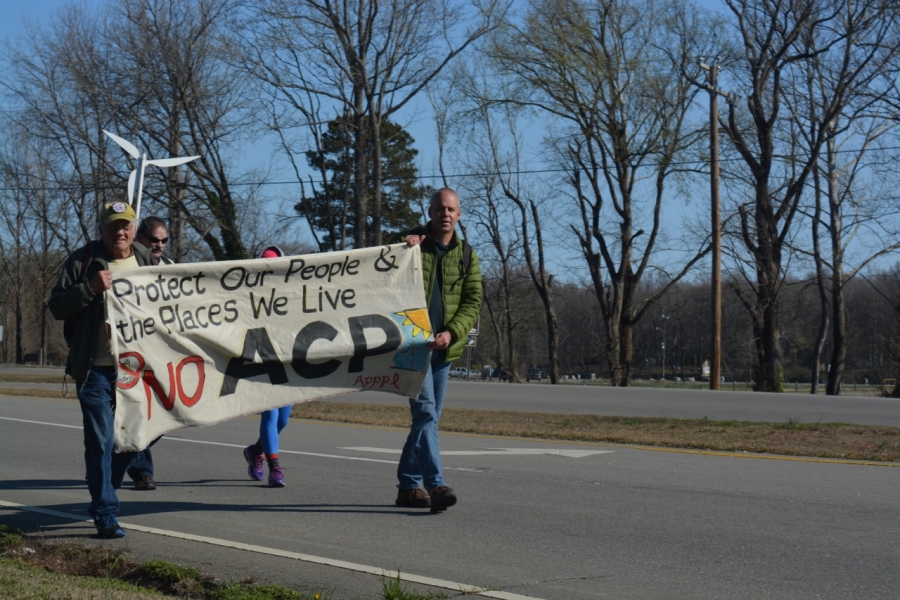The 15-day walk mostly parallels the proposed route of the pipeline, a joint effort between Dominion Power and Duke Energy, said Greg Yost, one of the organizers of the march.
Those marching represent a broad alliance of groups which have joined against the pipeline, which would carry gas from West Virginia to North Carolina.
The March began in Garysburg Saturday and will end in Pembroke on March 18, the nominal end of the line, Yost said. It will cover an additional 35 miles to Hamlet along the route of a proposed spur line.
This morning the marchers carried a banner and miniature wind turbines to promote wind and solar power generation.
He said the pipeline is not yet a done deal. “The pipeline has not received Federal Energy Regulatory Commission approval.”
Although approval is likely, the North Carolina Alliance to Protect People and the Places We Live will have its constituents contact Governor Roy Cooper’s office, the state Department of Environmental Quality and the state Utilities Commission, asking for a closer look at the issue. “It needs an assessment on many numbers of issues, health and safety and whether it’s needed like they say,” Yost said.
He said construction of the pipeline would mean a generational investment “tying ourselves to that fuel for the next 30 years. It looks cheap and affordable, but the Marcellus Shale is being played out. Gas is price volatile. Sun and wind goes down, down, down.”
The walk has sparked interest in its early stages, Yost said. “Especially in Garysburg, there’s a lot of interest. The pipeline is three-quarters of a mile off the main route. It would be coming through people’s communities.”
-
 Click to open image!
Click to open image!
Click to open image!
Click to open image!
-
 Click to open image!
Click to open image!
Click to open image!
Click to open image!
-
 Click to open image!
Click to open image!
Click to open image!
Click to open image!
-
 Click to open image!
Click to open image!
Click to open image!
Click to open image!
-
 Click to open image!
Click to open image!
Click to open image!
Click to open image!
-
 Click to open image!
Click to open image!
Click to open image!
Click to open image!
https://rrspin.com/archives/item/14347-march-against-pipeline-passes-through-weldon.html#sigProId22833d777f
While they won’t be doing it on the march, Yost said the alliance will be offering presentations to boards of county commissioners “to alert them on tax revenues. The overall impact is the drop in tax revenue through the loss in property value.”
Both the Halifax County Board of Commissioners and Roanoke City Council have endorsed the pipeline.
In a statement on the matter, Marvin Winstead, a leader with the group Nash County Stop The Pipeline, said he objects to being strong-armed. “I'm an impacted landowner. These companies, while they may have the word public in their title, they're privately held shareholder corporations. They're attempting to make an economic sacrifice zone of my land for their corporate profits.”
The alliance said in the statement, “Ratepayers will be left holding the bill for redundant pipeline assets that will encourage expanded fracking while allowing eminent domain to take land for private gain for Dominion’s and Duke’s stockholders. The $5.5 billion project will cross every major watershed, threatening North Carolina’s recreational fisheries, cutting through forests and wetlands, destroying family farms, like Winstead’s, and posing risks to health and safety for communities all along the way.”
Native Americans, the alliance said, are among those adversely impacted by Duke and Dominion’s plan, particularly in Robeson, Hoke, and Scotland Counties.
Alisha Locklear Monroe, a Lumbee Indian active in the group EcoRobeson, said, "My native people have always been on this land in Robeson County. Now big industry is threatening to take our land through eminent domain. As a mother and as a native, my heart aches for our Mother Earth.”
The proposed pipeline route through Eastern North Carolina is the third proposed route for the ACP, the alliance said.
The first proposed route took the pipeline near Durham and Raleigh, large urban cities with communities of significant wealth and political power, according to the statement. The second proposed route would have gone to two Duke Energy plants supplied by methane gas, near Raleigh and Hamlet. “Now this third route is proposed to be longer and a more circuitous route through the poorest and most racially diverse, rural region of the state and possibly the nation, with additional pipelines being proposed to reach Duke Energy’s facilities.”








